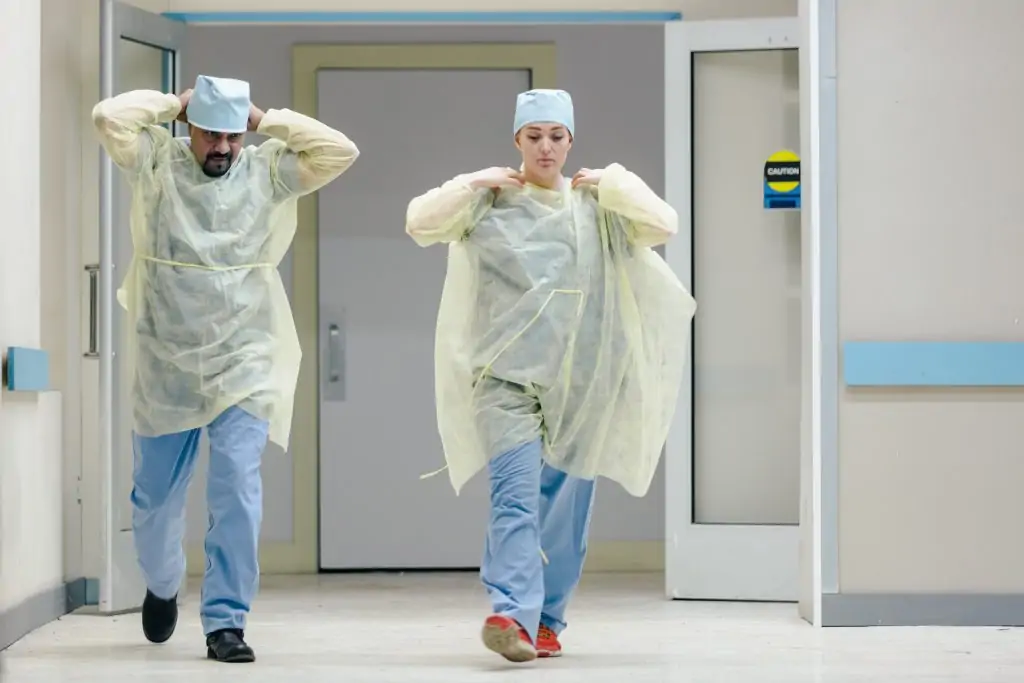If you’re considering becoming a doctor, but you’re not quite sure if it’s right for you, you’re not alone. There are plenty of people that find themselves wondering, “Should I be a doctor?”
Some of these people ultimately decide that they should pursue their doctoral degree. Others decide that they shouldn’t.
The unfortunate part is that some people become doctors and later decide that they shouldn’t be. Others find themselves in the opposite predicament, having finished medical school and decided this wasn’t what they wanted after all. So, how do you make sure you don’t become one of the people on either side of that equation who made a mistake?
We’re going to talk about some of the things that you need to know before you make your choice. There are plenty of reasons to pursue medicine. But there are plenty not to as well. So, let’s take a closer look.
 Why Become a Doctor?
Why Become a Doctor?
7 Signs You Should Be a Doctor
When it comes to looking at medical school, you want to take a look at some of the benefits of being a doctor. These benefits are what will help you feel like you’ve made the right choice. Be sure to read through each of these because some may have a powerful meaning to you, and others may not.
1. You have a strong desire to help others.
Medical school is extremely difficult. And even that is an understatement. It’s going to be the most challenging time in your entire life. If your desire to become a doctor is based on anything but a strong desire to help other people, you’re never going to make it through.
If you do have this motivation, however, you’ll be better equipped to push through the hard stuff.
2. You know what you don’t know.
Far too many people think that they have to know everything. The problem there is that they pretend to know things that they actually don’t. This may make you look good in the moment, but it’s not helping anything in the long run.
As a doctor, and especially as a medical student, you have to be willing to admit that you don’t know everything and get the help you need.
3. You never give up.
If you’re the type to continue pushing forward, no matter how tough it gets, you have the right temperament to become a doctor.
Getting through medical school and working with patients as you become a doctor is all about this process of pushing through adversity. There isn’t always going to be an easy way out. So make sure you have that inner strength.
4. You’re observant of all the signs.
When a patient comes to you with symptoms or presents with specific test results, you need to be able to evaluate them carefully. You’ll also need to listen to them and assess the things that they say.
All of this information is going to help you make an accurate recommendation or diagnosis of the patient.
5. You know how to interpret what you read rather than regurgitate it.
Textbooks will tell you a lot of information. Being out there in the real world with real patients will tell you a whole lot more. You need to have the ability to apply and interpret the things you’ve read in ways that really happen. Otherwise, you could miss a diagnosis because you’re caught up in textbook situations.
6. You’re willing to put in the work, whenever you need to.
Doctors work nights, weekends, holidays, and all those other hours no one wants. They also work hard all the time. In fact, they work upwards of 60 hours per week, sometimes up to 80 hours or more.
In order for that to work in your life, you need to have a strong desire to work hard. You also need a level of dedication to your job and your field.
7. You have compassion for your patients.
We’ve all met doctors who had no bedside manner. We’ve all known doctors that didn’t know how to talk with a patient or sound like they cared. You don’t want to be that doctor. If you have the ability to relate to your patients, to care for them, and to show empathy and compassion, then you don’t have the right skills for this type of career.
5 Signs You Shouldn’t Become a Doctor
When it comes to why being a doctor is not worth it, there are several different things to consider. If you find yourself falling into any of these categories, you may want to think long and hard about your career path and whether it’s the right one for you.
1. Someone else is telling you that you should.
If you’re planning to go to medical school and become a doctor because someone else is telling you to that’s one of the worst reasons to go. Medical school and the career you’ll have at the end of it are arduous work. You’re going to be putting in hours of your life, spending time away from friends and family, and the things you enjoy and a whole lot more. That’s not something that you should attempt if it doesn’t mean something to you.
2. You want to make a lot of money.
Being a doctor is a profession that’s commonly associated with getting rich. If you’re looking for a job that’s going to make you a lot of money and that’s all you care about, this is probably not the job for you.
There’s way too much hard work and time involved in this career for you to want to stick with it. Not only that, but you’re working a whole lot of hours in order to get that pay, which means when you break it down into an hourly rate, it’s not so good.
3. You don’t like working with people.
Working with people is kind of the whole job for a doctor. You have coworkers in other doctors, nurses, residents, and specialists. You also have patients, and all of those people are going to be around … a lot.
If you don’t like working with other people and having someone continually second-guessing you or questioning you, then this is absolutely not the right profession for you.
4. You don’t want to work long hours.
Doctors work upwards of 60 hours a week. If you’re not interested in working those long hours or if you’re the type of person who wants nights and holidays with your family. If you want a 9 to 5 lifestyle, that’s not generally going to be possible as a doctor.
Those who struggle with working on the weekends or not being able to join family and friends with their plans are definitely going to struggle with this career.
5. You don’t use critical thinking skills.
If you’re the type to read a book and repeat the content back, then you’ll do great in a number of careers, but medicine isn’t one of them. Medicine requires you to actually apply the information that you’re learning, and sometimes you have to interpret and apply that information in entirely different ways. The textbook isn’t right every time.
Common Traits of Good Doctors
Being a good doctor isn’t just about the signs that we mentioned above. It’s also about some specific traits that you definitely want to have. Now, these aren’t 100% required, and there are doctors who don’t exhibit all of these traits, but the ones who do have them will be the best of the best.
Confidence – Being confident in yourself and your work is crucial as a doctor. It’s a good idea to tell people to get a second opinion on serious situations or even for you to get a second opinion yourself. Still, you need to have confidence that you’re doing the right thing.
Humility – Understand that just because you’re the doctor doesn’t mean you’re better than anyone else. The best doctors are ones that understand that they are still just people too.
Compassion – Caring for the patients that you treat is about more than just giving them medications or wrapping a broken bone. It’s also about actually showing them emotion and affection. This indicates that they really do mean something you as a person, not as a paycheck.
Adaptability – This is not the type of career where you can make a schedule for the day and expect everything to go exactly as planned. Things are going to come up, and you’re going to have surprises every day. You need to be able to deal with them and keep on going.
Resilience – When problems come up, or obstacles appear in your way, you need to know how to push through them, go around them, or do whatever else you have to. No matter what, you need to be dedicated and determined enough to keep moving forward.
Work Ethic – You need to be the type of person who is proud to work hard and ready to put in whatever effort is necessary. If you don’t have a strong work ethic, you’re never going to make it in this career.
How Hard is it to Become a Doctor?
If you’re still reading here and you’re still thinking about whether or not you should be a doctor, you may want to know how hard it actually is. The short answer is that it’s going to be extremely hard to get through this process.
Becoming a doctor means a whole lot of time in school. You’ll spend four years completing an undergraduate degree and another four years of medical school. Then you’ll spend at least three and up to seven years in a residency program. All of that schooling takes a great deal of time and effort.
On top of the time commitment, the schooling and the residency programs that you go through are complicated. You’ll need to learn a great deal of information in a short amount of time, and you’ll need to be able to retain that information and apply it in real-life situations. Also, the information on its own is challenging to learn.
Research shows that fewer than 15% of people who want to be a doctor will actually become one. That means a lot of people put in the work but don’t actually get to the finish line. The reason? It’s tough.
Is it Worth Becoming a Doctor? What are the Benefits of Becoming a Doctor?
Maybe you’re getting this far and wondering if this process is even worth it. Are you sure that you want to become a doctor? Is it worth it to be a doctor? There are a number of different benefits to consider, so let’s take a closer look at a few of those to help you make your decision.
1. High level of job security.
There are a lot of doctors out there, but there still aren’t enough for all of the people who need doctors. That means you have excellent job security once you do achieve this level. You’re not likely to lose your job due to downsizing or facilities shutting down.
2. Have a positive impact on the lives of your patients.
Every time you meet with a patient, you have the ability to make their lives a little bit better. Whether you’re helping to treat a chronic or terminal condition or you’re just giving them advice and guidance, you’re improving their lives.
3. Feel like you’re making a difference in the world.
Working with patients is a great way to feel like you’re making a difference. Even though the number of patients you can see is small compared to the number of people in the world, you’re still doing your part. That can be a reassuring feeling.
4. Live wherever you want to live.
There is always a need for doctors and in just about every part of the world. That means you get the freedom to work wherever you want to work rather than being stuck in whatever place will offer you a job. If you want to travel to a new state or a new country, you can with a medical degree.
5. No need for physical labor.
Some people love the idea of physical labor. Other people don’t. As a doctor, there is no physical labor. Your job doesn’t even entail moving your patients because others within the facility take care of that for you. If you’re looking for a job that keeps physical labor out of it, you’re on the right track.
6. High level of respect and esteem.
It’s not a good idea to get into this profession solely for the respect and admiration of others. It can be a nice perk of the job; however, when you factor it in with everything else. People will show you respect, and they’ll definitely be grateful to you for everything that you can do for them and for others.
7. Meet some amazing people.
Whether it’s your patients or your coworkers, you’re going to meet some truly amazing people as a doctor. Because of the type of profession, you’re actually going to meet quite a few people, and those people each have a story to tell for themselves.
Are Doctors Happy with Their Jobs? What Does the Research Say?
No one wants to get into a field where the other people in that field are unhappy all the time. Even with all of the great things that doctors do and the people that they help, there is some discontent. In fact, research seems to be conflicted over how doctors really feel about their jobs.
Overall, research seems to show that, if doctors are not happy with their jobs, they are at least satisfied. In fact, some research suggests as many as 76% of doctors and physicians are at least somewhat satisfied with their job. Only 13% were unsatisfied or very unsatisfied. This is a relatively good result compared to other fields of work.
Should You Go to Med School if You’re Not Sure You Want to be a Doctor?
Maybe you’re still on the fence about whether medical school is the right future for you. If you’re not quite sure you’re on the right track, maybe you’re thinking about going to medical school anyway.
The truth is, medical school is for those who want to become doctors. If you’re not quite sure that this is the right path for you, then the best option might be to take some undergraduate classes in medical subjects or to shadow a doctor or even a resident for a few days.
Going to medical school when you’re not sure you’re on the right track is likely to end in burnout, frustration, and a whole lot of overwhelm.
Wrapping Things Up: Should I Be a Doctor?
When it comes to deciding on your own answer that that all-important question of, “Should I be a doctor?”, no one can decide but you. Now, if you’re the type of person who really wants to help others and who is willing and able to push through and never give up, this might be a great career path for you. On the other hand, if you’re the type who wants to find a job where you can make a lot of money but not deal with people, this is definitely not the way to go.
If you found this post helpful, you’re definitely going to like our other medical school tips here.
More medical school study resources here:
> What is the Timeline of Medical School?
> When to Take Step 1: The Ultimate Guide

 Why Become a Doctor?
Why Become a Doctor?














